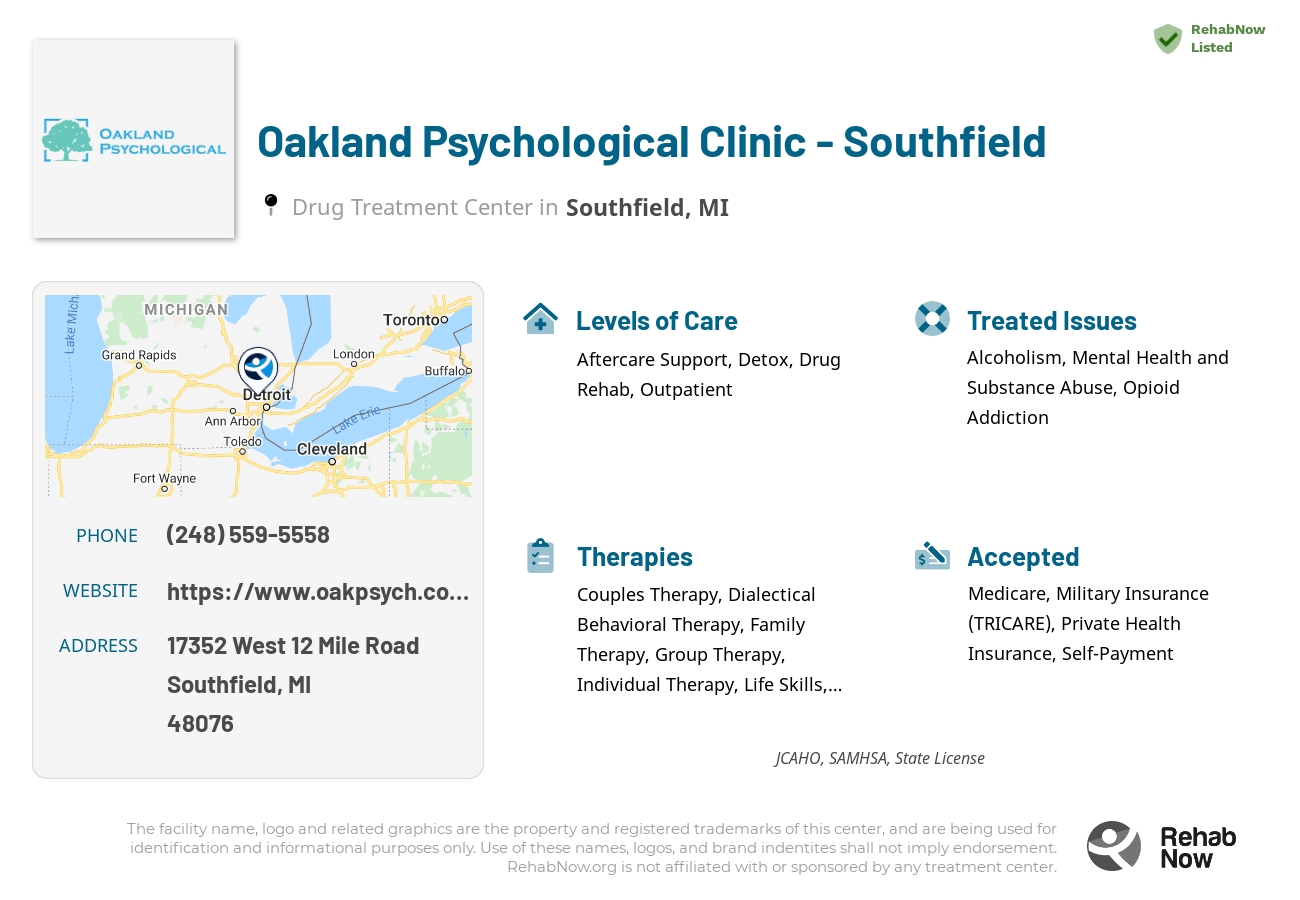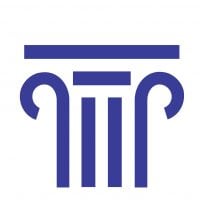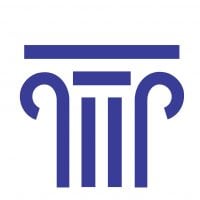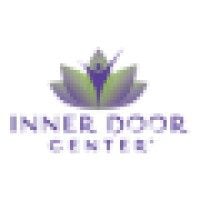Oakland Psychological Clinic - Southfield
Drug Rehab Center in Southfield, Michigan
Oakland Psychological Clinic - Southfield is a full-service psychological clinic specializing in addiction and substance abuse treatment, providing evidence-based treatments and tailored services in a safe and comfortable environment with a multidisciplinary staff, earning accreditations from the Joint Commission and CARF, and recognized as one of the best substance abuse programs in Detroit.
About Oakland Psychological Clinic - Southfield in Michigan
Oakland Psychological Clinic - Southfield is a full-service psychological clinic located in Southfield, Michigan. They provide a wide range of mental health services and specialize in treating addiction and substance abuse. They provide a safe and comfortable environment and offer a full team approach with their experienced, multidisciplinary staff. The clinic provides individual and group therapy, family therapy, and an array of clinical and supportive services that are tailored to the specific needs of each patient.
At Oakland Psychological Clinic - Southfield, their staff of compassionate and experienced professionals work with individuals and families affected by addiction and substance abuse. They provide evidence-based treatments, such as cognitive behavioral therapy (CBT), Dialectical Behavioral Therapy (DBT), and medication-assisted treatment (MAT). They also offer education and support, provide psychoeducation to give clients the tools to build resilience and increase impulse control, and develop relapse prevention strategies to help clients maintain sobriety.
Oakland Psychological Clinic - Southfield has earned several accreditations, including the Joint Commission accreditation for behavioral health and The Commission on Accreditation of Rehabilitation Facilities (CARF). The clinic is certified to provide opioid treatment and is a State of Michigan approved provider for substance use disorder treatment. Additionally, Oakland Psychological Clinic - Southfield has been honored by the Detroit Free Press and Hour Detroit as one of the best substance abuse programs in the city.
Genders
Ages
Modality
Additional
Accreditations
State License
SAMHSA

JCAHO
Conditions and Issues Treated
Opioid addiction treatment should be done in a medically supervised drug rehab. While taking opioids, users will typically use other substances to enhance the effects of opioids or to reduce the adverse effects of opioid use. Opioid addiction treatment will include detoxification and drug rehab counseling to help both the user and their loved ones learn how to live a successful sober lifestyle.
Treatments such as methadone, buprenorphine, and naltrexone are three medications that can help treat opioid addiction. These drugs work on the brain’s pleasure center and reduce cravings and the effects of illicit opioids such as heroin. These drugs can be either given orally or by injection. Individual drug rehab counseling sessions can be helpful to discuss any questions or concerns with the drug treatment program. This counseling will also help the user set goals for when they finish drug rehab.
Opioid addiction recovery is a long process. Many of the changes to the brain caused by opioid use cannot be undone, but with time and the proper treatment, a person can return to normal function. After detox, treatment will include drug rehab counseling and entering a halfway house or sober living community. Aftercare is critical to long-term recovery, as it helps the user avoid relapsing and entering back into drug rehab.
Levels of Care Offered
This center offers a variety of custom treatment tailored to individual recovery. Currently available are Aftercare Support, Detox, Drug Rehab, Outpatient, with additional therapies available as listed below.
An addict may have to go through alcohol or drug withdrawal. While detox may be uncomfortable, it is not life-threatening. Detoxification allows the addict to rid the body of all traces of drugs or alcohol and gives the addict a clean slate for their recovery. In an inpatient or outpatient setting, detox can be managed medically.
“Outpatient treatment is ideal for those who have a lower intensity addiction. It’s also suitable for those with a supportive environment and those on a tight budget.
Outpatient treatment can be considered the lowest intensity level of addiction treatment. It is ideal for early phase addiction or lower intensity addictions. It may involve weekly sessions instead of daily. Peer group support, 12-step programs, and individual counseling may still be used and anti-addiction medication.
Aftercare support is vital to those who have completed a drug or alcohol treatment program. This support comes in individual and family counseling, treatment of psychiatric and other medical conditions, and medications to reduce cravings. It helps recovering addicts adjust to normal day-to-day activities and can last for a year or longer.
The majority of drug and alcohol addicts who receive aftercare treatment do not relapse. It is estimated that without aftercare, the relapse rate will be between 70 to 90 percent for most people. Aftercare is the final stage in addiction recovery, but it will also help maintain sobriety if relapse does occur.
Therapies & Programs
No single treatment works for all addicts; therefore, the goal of treatment and therapy should be to find what works best for each individual. Some people requiring addiction treatment may only need a few weeks of inpatient care. Others will require long-term residential care. Tolerance and withdrawal levels vary from person to person and thus affect the intensity of the treatment needed.
If an individualized approach to treatment and therapy is not offered, addicts may fail to reap benefits from their efforts. Professionals must customize plans according to their patient’s needs, limitations, and strengths. The goal of all forms of addiction treatment should be for addicts to find healthy ways to cope with their addiction and its underlying causes.
Couples therapy for drug addiction is a unique form of therapy that allows family members to work through the emotional issues of their loved one’s addiction together. Family members can support each other while learning how to cope with the addiction and encourage healthy changes.
Accordingly, couples therapy for drug addiction is designed for an addict and their significant other or spouse. The two will work with a therapist to learn how the addiction affects themselves and the relationship and how to break the negative patterns of behavior that may have developed.
Drug addiction can destroy a person’s life, as well as their family and friends. The loss of one’s ability to choose how to live and behave often leads the addict into depression, anger, guilt, and many emotional problems.
The therapies usually include siblings, children, and parents who are involved in their daily lives. These sessions are vital because they address past issues that may have hampered an addict’s or alcoholic’s recovery and provide support at a crucial time!
One of the most critical aspects of family therapy is helping addicts’ loved ones see their situation in a new light. It’s also one of the most challenging things a family can do when a loved one struggles with addiction or alcoholism.
Group therapy is held in a safe, controlled setting where patients can feel comfortable sharing their struggles and gaining perspective through shared conversations. It takes place in a group rather than one on one to prevent feelings of isolation or being unique in their situation while creating an environment for addicts at Oakland Psychological Clinic - Southfield to develop fellowship, accountability, and support. Group therapy is an important tool in recovery that prevents cravings that prompt a return to active addiction.
This type of therapy involves the use of a variety of therapeutic techniques to help addicts recover from past traumas that might have triggered their substance abuse. During these sessions, therapists will work with the addict to address painful memories and learn how to cope effectively with stressors as they arise.
During these types of sessions, therapists will typically focus on three main goals:
- Identifying and expressing painful emotions associated with past traumas.
- Reducing the effects of stress on an addict’s life by developing more effective coping mechanisms.
- Developing healthy ways of thinking about stressful situations that can help addicts avoid substance abuse issues in the future.
This type of therapy is typically used in conjunction with other types of addiction treatment services. By identifying and dealing with the root cause of addiction, most addicts can overcome their cravings and prevent relapse once they leave rehab.
Many different types of addiction treatment services exist to help addicts safely get sober, but it’s important for recovering individuals to find a therapist or support group that will help them address the root cause of their addiction.
Dialectical Behavior Therapy is a form of Cognitive Behavioral Therapy that helps patients understand the relationship between their thoughts, feelings, and behaviors. It is beneficial for those whose addictions and behaviors stem from severe mental health issues. It aims to help the patient achieve their goals and identify how they can enhance their lives.
Cognitive-behavioral therapy is a talking-based method that helps people struggling with addiction replace destructive behaviors with healthier ones. CBT also helps them identify the underlying thoughts and beliefs that cause these behaviors in the first place and ways to control those thoughts and feelings. It can be administered as a holistic therapy or as part of combination therapy and—as opposed to turning to drugs and alcohol—helps addicts learn how to respond to negative thoughts instead.
Rational Emotional Behavior Therapy (REBT) is a type of CBT that uses images, thoughts, and behaviors to teach self-help skills to people recovering from addiction. It’s vital because it allows recovering addicts to work through their issues alone while having support available.
REBT is based on the idea that people have many irrational but habitual thought patterns that fuel harmful behaviors and feelings. Learning to identify destructive patterns in oneself can help one replace them with healthier ones.
Life skills training is beneficial for addicts in recovery because it helps them learn how to take care of themselves and improve their quality of life, which can promote feelings of purpose and motivation.
This type of treatment works by teaching individuals life-enhancing skills that support positive living, including:
- Healthy lifestyle habits
- Skills to effectively manage stress
- Effective communication skills to help them get their needs met without turning to drugs or alcohol
- Money management and budgeting skills so they can continue to take care of themselves after treatment ends.
Payment Options Accepted
For specific insurance or payment methods please contact us.
Is your insurance accepted?
Ask an expert, call (888) 674-0062
Oakland Psychological Clinic Associated Centers
Discover treatment facilities under the same provider.
- Oakland Psychological Clinic - Lake Orion in Lake Orion, MI
- Oakland Psychological Clinic - Milford in Milford, MI
- Oakland Psychological Clinic - Livonia in Livonia, MI
- Oakland Psychological Clinic - Grand Blanc in Grand Blanc, MI
- Oakland Psychological Clinic - Flint in Flint, MI
Learn More About Oakland Psychological Clinic Centers
Additional Details
Specifics, location, and helpful extra information.
Southfield, Michigan 48076 Phone Number(248) 559-5558 Meta DetailsUpdated November 25, 2023
Staff Verified
Oakland Psychological Clinic - Southfield Patient Reviews
There are no reviews yet. Be the first one to write one.
Southfield, Michigan Addiction Information
Michigan has the second-highest rate of drug and alcohol abuse in the nation. Heroin is linked to more than 50% of the state's hepatitis C cases. Marijuana is the drug most often associated with crimes in Michigan, followed by methamphetamines. Opioids alone are responsible for almost 20% of all drug overdose deaths in Michigan.
A survey shows that 15% of teens and young adults in Southfield, MI had abused a prescription drug. In Southfield, there were 23 drug-related overdoses in 2008. Of those who overdosed, 49% were male and 51% were female. The most common types of drugs abused are opioids, methamphetamines, and benzodiazepines. Some of the most popular treatments include inpatient and outpatient programs, 12-step programs, and holistic therapies.
Treatment in Nearby Cities
- Alpena, MI (177.3 mi.)
- Kingsford, MI (331.3 mi.)
- Bessemer, MI (434.9 mi.)
- Saint Joseph, MI (169.7 mi.)
- Wakefield, MI (430.4 mi.)
Centers near Oakland Psychological Clinic - Southfield
The facility name, logo and brand are the property and registered trademarks of Oakland Psychological Clinic - Southfield, and are being used for identification and informational purposes only. Use of these names, logos and brands shall not imply endorsement. RehabNow.org is not affiliated with or sponsored by Oakland Psychological Clinic - Southfield.












